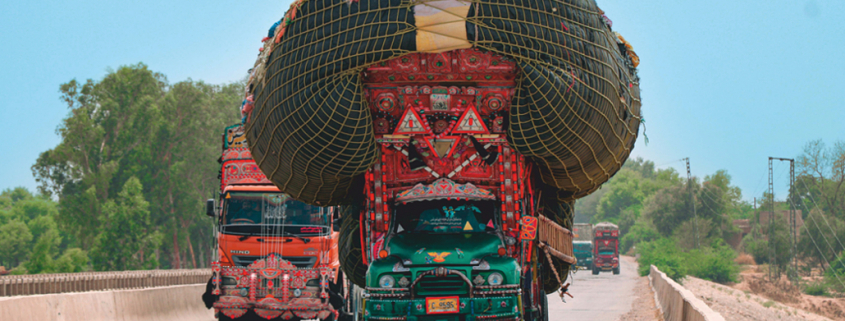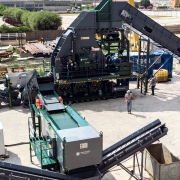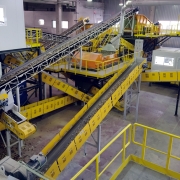Insufficient Infrastructure: Business Opportunities in Pakistan
Industry experts believe that the pressure to invest in waste treatment, recycling, and disposal will increase in the foreseeable future. That will lead to business chances.
The Islamic Republic of Pakistan would generate approximately 49.6 million tons of solid waste and 4.36 billion cubic meters of domestic and industrial wastewater a year, Dr. Muhammad Khurshid, a Ph.D. in natural resources management, wrote in Pakistani “Tribune” in June last year. Approximately 60 to 70 percent of solid waste and merely one percent of the total wastewater is treated before its disposal.
According to a study by Dr. Saima Shafique and Tom Clark on waste management in the country through the SWITCH-Asia SCP Facility (funded by the European Commission), Pakistan generates 48.5 million tons of solid waste annually. On average, nationwide waste generation ranges from 0.24 to 0.65 kilogram/capita/day, and this has been growing at a rate of 2.4 percent annually, the authors stated in the report published in 2022. Not all of the over 220 million Pakistanis have access to services such as waste management.
As reported, in most places, the local authorities and municipal governments carry out waste management, “with the informal sector playing a huge role in waste collection and separation”. There is a shortage of material recovery and sorting facilities and sustainable options for waste treatment. “Most municipal waste is either burned openly or dumped in vacant lots,” the authors wrote. The government of Pakistan would estimate that the daily solid-waste generation is around 87,000 tons, “but there are alternative sources that challenge the veracity of this figure”.
Karachi, for example, Pakistan’s largest city, has the highest amount of daily waste generation; the metropolitan city’s more than 20 million inhabitants produce a waste volume of 9,000 to 13,500 tons per day. Dr. Muhammad Khurshid quantified the amount of municipal waste at 16,500 tons daily. According to his account, Lahore (10 million people) generates 7,650 tons, Faisalabad (7.5 million inhabitants) 5,017 tons, Rawalpindi (5.9 million people) 4,500 tons, Peshawar (2.9 million inhabitants) 2,048 tons and Quetta (600,000 people) 716 tons each day.
“The problem is so persistent and ubiquitous that many locals report it as a major nuisance and health concern,” the authors of the SWITCH-Asia report pointed out. “Bureaucratic hindrances, urban sprawl, very low levels of public awareness on the subject, and a lack of both planning and capacity have been cited as the main causes for the unfortunate state of the existing solid waste management system in Pakistan.” Though collection rates were moderate at 60 to 70 percent, only a small volume would reach final disposal. “Municipalities employ street sweepers and sanitary workers in addition to their own staff for the collection of waste, which is carried out with the help of donkey carts, open trucks, trolleys, wheelbarrows and suchlike. Collected waste is dumped in temporary storage spaces, where scavengers pick through it for recyclables, hence informal channels are established for recycling. Rather than being sent for treatment, for disposal in landfills or to incineration facilities, as it would in developed countries, waste rarely goes beyond final dumping in Pakistan.”
Over the years, the government had engaged several external consultants, with the support of multilateral development agencies, to elaborate solid-waste management guidelines and some preliminary literature on “waste to energy” and composting, the authors of the SWITCH-Asia report informed. “The city of Lahore in Punjab was the first city in the country to have a formalized waste management system, in the form of the Lahore Waste Management Company. Although similar interventions had been planned for other provinces through programs such as the Sindh Cities Improvement Investment Program (SCIP) and the planning of a landfill site in Peshawar, these interventions have thus far achieved only limited success.”
Government regulations
As stated, there have been many policies in Pakistan which would support the concept of waste minimization through the 3Rs, calling for mechanisms to improve the efficiency of waste management in the country. “However, due to budgetary and institutional constraints, these policies have not been successful in instigating any lasting change to the waste landscape in the country.”
The legal regulations regarding waste include:
- The Pakistan Environmental Protection Act 1997;
- National Environment Action Plan (NEAP) 2001;
- Draft Guidelines for Solid Waste Management 2005;
- National Environment Policy 2005;
- National Sanitation Policy 2006;
- National Climate Change Policy 2012;
- National Development Strategy 2012;
- Hospital Waste Management Rules 2005 & 2014;
- Punjab Environmental Policy 2015;
- Draft Hazardous Waste and Hazardous Substances Rules, 2016.
“The success of these policies has also been limited by the lack of availability of accurate data on type, quantity and composition of solid waste produced in Pakistan,” Dr. Saima Shafique and Tom Clark wrote. “To date, there has been only one state-led waste quantification initiative in the country, when the Ministry of Environment and Urban Affairs Division initiated the ‘Data Collection for Preparation of a National Study on Privatization of Solid Waste Management in Eight Selected Cities of Pakistan’ in 1996. Subsequent research has either built on these estimates or new estimates have been calculated by academic researchers in private studies.”
Implementation of waste minimization measures
There are also implementations of waste minimization techniques and 3Rs being managed through a combination of public and private institutions. In Pakistan, public institutions and bodies are assigned with providing 3R-related support:
- Ministry of Climate Change;
- Pakistan Environmental Protection Agency (Pak-EPA) / Provincial EPAs;
- National Cleaner Production Center Foundation (NCPC);
- National Productivity Organization (NPO);
- City-wide solid waste management companies, such as Lahore Waste Management Company, Faisalabad Waste Management Company, Gujranwala Waste Management Company;
- Provincial Waste Management Boards;
- Provincial Water and Sanitation Departments.
As reported by Dr. Saima Shafique and Tom Clark, there are also initiatives from private companies and the manufacturing sector, “but their practices have been limited to within their own respective organizations”. Since plastic pollution is an ubiquitous problem, most private initiatives focus on dealing with plastic waste. For example, in 2019, Unilever pledged to halve the use of virgin plastic in their packaging by 2025. That included their operations in Pakistan. “The corporation has also vowed to collect and process more plastic than they sell. These targets will mainly be achieved through shifting away from single-use packaging towards multi-use packs (reusable and refillable formats) and alternative packaging solutions, such as so-called ‘naked’ products.” For eliminating plastic waste, Unilever would invest and collaborate to improve waste-management infrastructure in many of the countries in which it operates, it purchases and uses recycled plastics in its packaging, and it participates in Extended Producer Responsibility schemes.
WWF and Coca-Cola Corporation were an example of a partnership aimed at plastic recovery. “Initiated in 2019, their program collected PET bottles in three shopping malls in Lahore and sent them to a partner recycling facility. The initiative also promoted general public-awareness campaigns through monetary and other incentives in the malls.” Furthermore, Proctor and Gamble Pakistan has waste reduction at the center of its sustainability agenda, the authors informed. By 2018, 86 percent of packaging produced by the company in Pakistan was recyclable, and the corporation aims to increase this figure to 90 percent by 2030.
The Pakistan government, through the Ministry of Climate Change, has taken steps to deal with plastic waste, too, such as imposing a blanket ban on using polyethylene bags in Islamabad in 2019. “It should be noted though that this isn’t entirely new. Previous governments have made multiple attempts to institute a provincial ban on polyethylene bags over the last decade but failed.” In addition, multilateral development banks – for instance, the World Bank – supported implementing waste management programs in Pakistan. The Punjab Green Development Program is currently supporting the Punjab government in limiting and regulating the consumption of single-use plastics in the province, the authors informed.
Proposed: a sustainable model for Pakistan
According to Asif Iqbal, Yasar Abdullah, Abdul Sattar Nizami and Faiza Sharif from the Government College University in Lahore, and Imran Ali Sultan from the Government of Punjab, Pakistan is a developing country with an unstable economy and productivity growth, causing a high inflation rate. Therefore, in their opinion, the government had to focus more on the current crises in the food and energy sector, which are considered basic necessities for citizens, they wrote in the article “Assessment of Solid Waste Management System in Pakistan and Sustainable Model from Environmental and Economic Perspective”, published in October 2022. In such circumstances, the solid waste management (SWM) sector was a less-priority area for policymakers and politicians, as evident from the priorities of Sustainable Development Goals (SDGs), they stated. Pakistan would need more focus to improve waste collection efficiency as it found less than 75 percent in almost all cities except Lahore with 84 percent. For sectorial sustainability, they propose three separate waste collection streams – residential, commercial/ institutes and bulk waste – based on the physical characteristics of garbage. The residential waste consists of kitchen waste, raw material for compost manufacturing, and commercial areas’ waste was primarily rich in recyclables, requiring a centralized material recovery facility (MRF), the authors emphasized. “The facility will help hire the services of the informal sector, i.e., scavengers trained in waste separation, which will help integrate the informal sector into the circular economy.”
Bulk waste, for instance, debris, would help improve the internal road infrastructure at disposal sites. “Recovery of recyclables, compost manufacturing and methane capturing from disposal sites will generate direct revenue for the municipalities. Considering the local socio-economic situation and lessons from the SWM sector, a simple and flexible sustainable model is proposed to increase the sector’s efficiency.”
Power Generation from Waste
With its plans in the waste-to-energy sector, the government is aiming less at power generation and more at waste disposal, stated Germany Trade & Invest (GTAI), the Federal Republic of Germany’s international economic promotion agency, in April this year. To make investment more attractive, Pakistan’s energy sector regulator, the National Electric Power Regulatory Authority (NEPRA), has announced a competitive pre-tariff per kilowatt-hour for waste-to-energy projects. In August 2018, NEPRA permitted the construction of the first waste-to-energy plant worth 220 million US-Dollar. It is to be built in Lahore with a capacity of 2,000 tons of waste per day and 40 megawatts. Lahore Xingzhong Renewable Energy Company, a joint venture of three Chinese companies, is carrying out the project. Completion is scheduled for 2023.
The Sindh government signed memorandums of understanding with Dutch company Khan Renewable Energy and U.S. firm Green Waste Energy in early 2023. The plan is to install two waste-to-energy power plants. The project aims to process 3,000 tons of waste daily to generate 50 megawatts of electricity. The investment is estimated at 500 million US-Dollar. The project is also scheduled to be completed this year.
(Published in GLOBAL RECYCLING Magazine 3/2023, Page 4, Photo: Muhammad Rehman / pixabay.com)









